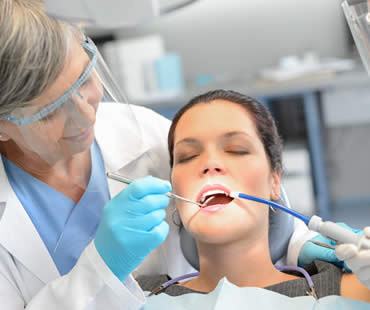
One of the greatest gifts you can give yourself is taking care of your oral health throughout your life. Practicing a consistent dental hygiene routine and maintaining regular visits to your general dentist are the best ways to increase your chances of a beautiful, healthy smile.
General dentists focus on preventive care and treating minor problems before they have a chance to worsen into serious issues. Even if you regularly brush and floss your teeth, plaque and tartar can be quick to develop. A dentist has the necessary tools and training to remove damaging deposits before they harm your smile. In addition to professional cleanings and examinations, most general dentists fill cavities, perform root canals, whiten teeth, and even offer additional cosmetic dental procedures like dental implants or veneers.
One of the main reasons for routine examinations is to identify various problems. One common issue that you want your general dentist to catch early is gum disease. When it is treated soon after it starts, you are more likely to avoid bone deterioration or tooth loss. The early stage of gum disease is called gingivitis and can be handled by your dentist with simple techniques. If it advances to periodontitis, that’s when bone or tooth loss become a possibility and more invasive procedures like scaling or root planing may be required.
Once you make your dental appointment, which is typically recommended every six months, make sure you keep your scheduled visit. Many patients fall victim to scheduling appointments and then cancelling, not realizing how important seeing your general dentist can be. If you have dental insurance, you can even use your dental benefits for examinations and treatments. This office accepts Blue Cross/Blue Shield of Louisiana, MetLife, and Cigna.
Choose a qualified general dentist and establish a long-term relationship now, so that you can enjoy your healthy and appealing smile for years to come.
We treat patients from Longview and the surrounding area

Your dentist plays an important role in your family’s healthcare. It’s more than just a teeth cleaning to keep your smile looking good; it’s a partner who helps ensure both your oral and your general health are the best they can be. That’s why it’s imperative to choose a qualified and skilled dental professional that you can stick with through the years to manage the oral health of each member of your family.
Ask friends, coworkers and neighbors for recommendations for a family dentist or conduct an online search. Once you have narrowed down your choices, schedule a consultation so that you can gather more information and get a feeling about the practice.
Consider the dentist’s credentials and experience. The dentist should have graduated from an accredited dental school and passed all exams and other requirements. Find out if the dentist has any specializations that you or a family member might be interested in, such as orthodontics or root canal therapy. If the practice offers more than one dentist in a group, make sure anyone you’ll see has the same level of experience and training. Ask about continuing education to see if the dentist keeps up with the most current techniques and trends.
Every family dentist should be willing to work with patients of all ages, but if you have family members who are very young or very old, make sure the dentist is skilled in their specific care. Inquire about options available for dental fears such as sedation dentistry.
Pay attention to all aspect of the dental office when you are there. Is the latest equipment available? Is the staff friendly and accommodating? Are you able to ask questions and get all of the information you need? Is the office location convenient? Are multiple appointments offered during one time slot? Do they offer emergency hours? Are financial policies outlined clearly?
A good family dentist takes the time to treat you and your family with care and personalized attention, as well as skill and confidence. Look for a professional who will play a trusted role as part of your healthcare team.
If you live in the Longview area contact us today

Giving some form of a sedative medication to patients during dental treatment is what sedation dentistry is all about. It causes relaxation and decreases anxiety so that the patient is comfortable and the dentist can work safely and efficiently. Sedation dentistry is most popular for those who experience mild to moderate dental anxiety, patients who have dental phobias, and children who are frightened by dental visits.
There are a number of advantages that sedation dentistry offers to both patients and dentists. Here are some reasons that it is popular with patients:
- Pain is diminished so that the patient hardly feels the instruments, needles, or anything else as part of the treatment.
- Awareness is reduced so that that patient doesn’t realize exactly what is happening and doesn’t keep track of the time spent in the dental chair.
- Anxiety is lessened so the patient feels calm and carefree while undergoing treatment that normally might cause upset.
- Side effects are minimal and rare, making sedation dentistry both safe and effective.
- The gag reflex is reduced so patients who might normally have problems gagging during treatment are able to undergo procedures without issues.
- Time is saved for the patient because often all treatments can be performed in one office visit, instead of having to make several trips and miss more time from work or other activities.
Dentists enjoy benefits of sedation dentistry as well:
- Patients are more cooperative and able to sit still during treatment, allowing dentists to get the job done with less trouble.
- Multiple procedures can be done in a single office visit, so the dentist can accomplish more in a single time slot.
- Reflexes of the patient are more controlled so that movement is less haphazard and the dentist can work more efficiently.
Schedule your appointment at our Longview dental office

Obstructive sleep apnea is a condition created when a portion of the upper airway is blocked, causing breathing interruptions during sleep and low blood oxygen levels. As many as 20% of adults are affected by mild obstructive sleep apnea, while one in fifteen suffers from more severe apnea.
Symptoms of obstructive sleep apnea include snoring, extreme daytime drowsiness, restless sleep, high blood pressure, depression, problems with mental function, as well as a host of other mental and physical concerns. Left untreated, obstructive sleep apnea can lead to a long list of serious medical conditions, including hypertension, heart attack and stroke.
If you have been diagnosed with obstructive sleep apnea, your doctor may initially treat the condition with a CPAP device that you wear while sleeping. While a CPAP machine will reduce the obstruction to the airway, it is not a cure and will only be effective during use. Other non-surgical treatment recommendations may include the wearing of mouthguards to reposition the jaw, sleep position changes, or weight loss.
Tongue muscle advancement involves moving the bony attachment of the tongue muscles, and can be combined with palatal surgery to reduce excess tissues. This therapy may also include removing enlarged tonsils and nasal surgery. These treatments are most often used for milder cases of obstructive sleep apnea.
However, if these treatments do not work or for more severe cases of obstructive sleep apnea, oral surgery offers solutions to correct apnea. Maxillomandibular Advancement is a procedure that repositions the upper and lower jaw and chin to open the airway. This treatment is highly successful and offers the greatest chance of permanent correction in moderate to severe cases of obstructive sleep apnea.
For more information about how surgical therapies and treatments can be utilized to address your obstructive sleep apnea, consult with a qualified oral and maxillofacial surgeon.
Our dental office is located in Longview

In order to ensure your comfort and ease during a dental procedure, sedation dentistry is often the best option. Many levels are available, including conscious oral sedation, inhaled sedation, and intravenous (IV) sedation.
Conscious oral sedation minimizes patient anxiety while allowing the patient to remain partially alert. Oral sedatives are used to accomplish minimal to moderate sedation. They come in the form of a pill, and are often taken within an hour of your dental procedure. Some dentists recommend a mild oral sedative the night before an appointment to ease anxiety and ensure a good night’s rest.
Depending on the dosage and on the individual recipient, an oral sedative can sometimes cause the patient to “doze off,” but the patient will never be fully unconscious and will awaken with a gentle shake. Even though you are never fully asleep during conscious oral sedation dentistry, you may not drive yourself home because you will not be fully alert.
Inhaled sedation utilizes nitrous oxide, also known as “laughing gas.” This gas is inhaled through a mask while your dentist controls the amount you receive. This type of sedation allows a patient to relax and to be fully comfortable, but to still be responsive. Nitrous oxide sedation has a tendency to wear off quickly. Because of this, you may be able to drive yourself home after your procedure.
IV sedation (sometimes known as “sleep dentistry”) provides the deepest, most relaxed sedation during dental procedures. Despite the name, IV/sleep sedation does not cause you to completely lose consciousness. Because the drugs used naturally produce a full or partial memory loss while active in your system, you may not remember anything that happened during your procedure. IV sedation is the fastest of the sedation dentistry methods. The amount of sedation is controlled by your dentist. You should not drive after IV sedation, as you may not be fully alert for a period of time.
Talk to your dentist about which sedation is right for you to ensure your dental procedure goes well and that you are comfortable throughout treatment.
Schedule your appointment at our Longview dental office

It’s not uncommon for children to be afraid of going to the dentist. Let’s face it, many adults don’t like visiting the dentist either. However adults mainly don’t want to take the time or don’t want to hear the news that they aren’t taking good care of their teeth. It’s different with kids though, who often have a real fear of the dentist, equipment, and the unknown situation. If your child is one of those who experiences anxiety at the mention of the dentist, here are some things you can do to help ease those fears.
Use visual aids:
It is helpful for some children to watch a video or read a book that will help them become more familiar and comfortable with going to the dentist. Your local library or the internet both likely offer resources for this purpose, and bookstores have books and DVDs for purchase. These visual aids help kids know what to expect in visiting the dentist, and what their role is in the process.
Visit the office:
Take your child to the dentist’s office prior to your appointment so they can observe the office, meet the staff, and see the area and tools used for examinations. The staff may even give your child an explanation of the tools that dentists use for checkups. Your dentist wants children to feel comfortable and confident in getting dental treatment, so most offices do their best to help your child adjust.
Explain the importance:
Even though fear sometimes overtakes logic, it’s still important to explain to your child the reasons for seeing the dentist. Help them understand the benefits of checkups, and the oral health consequences that may occur by not caring for their teeth and getting regular checkups.
If you live in the Longview area contact us today









